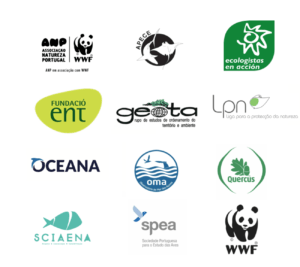Dear Karmenu Vella, Commissioner for the Environment, Maritime Affairs and Fisheries Dear João Aguiar Machado, Director-General for Maritime Affairs and Fisheries
Dear Ana Paula Vitorino, Minister of the Sea of the Portuguese Government
Dear Luis Planas, Minister of Agriculture, Fisheries and Food of the Spanish Government Dear José Apolinário, Secretary of State of Fisheries of the Portuguese Government Dear Alicia Villauriz, General Secretary of Fisheries of the Spanish Government
Lisbon and Madrid, July 23rd 2019
Subject: Iberian sardine, a tale of poor management
The 12 environmental non-governmental organizations (ENGOs) that sign this open letter have been closely following the developments of the management of the Iberian sardine stock (Sardina pilchardus) for almost a decade and have patiently waited for effective management measures, proportional to the serious and long-lasting state of depletion the stock has been in during this period. So far, the Portuguese and Spanish Administrations, with the oversight and consent of the European Commission (EC), have failed to deliver.
What we conclude:
- Scientific data show that the Iberian stock has been in a continuous declining pattern since the 1980s and that since 2009, it has been at unhealthy levels, below safe biological limits;
- The management measures taken so far are insufficient to ensure the recovery of the stock to healthy levels in an acceptable time frame.What we demand:
- That this stock – due to its commercial importance, scientific assessment and long-lasting depletion – is managed in line with the objectives set out in the Common Fisheries Policy (CFP);
- The adoption of a recovery and long-term management plan, considered to be precautionary and in line with the CFP objective to maintain all stocks at sustainable levels, within a short time frame;
- The elaboration of peer-reviewed social and economic scientific evaluations that can be the basis of measures that allow the fleets that were once dependent of Iberian sardine to maintain or even increase their profitability, while allowing the stock to fully recover.The ENGOs are convinced that if these conclusions are not assumed and if these demands are not met by the decision makers, the tale of mismanagement of the Iberian sardine will have further chapters. On the contrary, if our recommendations are followed (and the stock is given a true chance of recovery), the fisheries managers of both Member States and the European Commission have the opportunity to give this story a positive ending.Specifically, the Iberian NGOs once again ask:
a. That the Iberian sardine stock is managed accordingly with the CFP, specifically in line with article 2.2 that states that a precautionary approach should be applied “to fisheries management, and shall aim to ensure that exploitation of living marine biological resources restores and maintains populations of harvested species above levels which can produce the maximum sustainable yield.”;
b. That a Long Term Management Strategy that includes the recovery and the management of the Iberian Sardine stock is adopted. This plan must be considered by the International Council for the Exploration of the Seas (ICES) to be precautionary and in line with the CFP objective to maintain all stocks at sustainable levels. The adoption of such a plan is in fact what is being done at EU level for several other important pelagic stocks.
c. That the most up-to-date recommendations of the ICES are followed. Scientific advice is the basis for a sustainable management and the scientific data provided by the national institutes – and paid by tax money – should be seriously taken into account when setting fishing opportunities;
d. That immediate efforts are put in place for the financial, human and institutional capacity building of the Iberian institutes that contribute to ICES working groups and other marine research institutions in order to improve their capacity to collect and process scientific data that could serve the countries’ fisheries management interests;
e. An urgent and serious investment in finding durable solutions for the fisheries sector, which go beyond granting subsidies for closing the fishing activity. There are other small pelagic species on the Iberian coast that are being well managed, such as horse mackerel. This species is undervalued by the consumers and the TAC has even remained to be used fully. Thus, one of the solutions for the sector may be to encourage the consumption of horse mackerel and other species captured by the national fleets that are in good condition. However, it is necessary to keep these stocks well monitored from a scientific point of view;
f. Measures to diversify the activity are implemented and that professionals redirect to activities that do not cause other negative impacts on ecosystems, bringing benefits to local economies and not being an additional expense for the Member States (e.g.: Tourism). It is fundamental that PO’s and operators create alternative sources of income complementary to fisheries;
g. That the sector does not depend so highly on a single species, as it is important that, in the future, the sector does not focus its socio-economic dependence on one species, especially when it is a small pelagic that is influenced by factors that can hardly be controlled or managed;
h. That socio-economic studies that substantiate the fleet’s high dependence on the resource are carried out.

